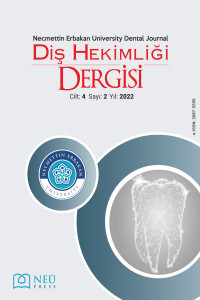Komplike Kron-Kök Kırıklı Bir Dişin Konservatif Tedavisi: Göreceli Başarı
komplike kron-kök kırığı, cam fiber post, reataçman, travmatik yaralanma
A Conservative Treatment of A Tooth with Complicated Crown-Root Fracture: Relative Success
___
- 1. Andreasen JO, Bakland LK, Flores MT, Andreasen FM, Andersson L. Traumatic dental injuries: a manual: John Wiley & Sons; 2011.
- 2. Andreasen JO, Andreasen FM, Andersson L. Textbook and color atlas of traumatic injuries to the teeth: John Wiley & Sons; 2018.
- 3. Andreasen J, Ravn J. Epidemiology of traumatic dental injuries to primary and permanent teeth in a Danish population sample. International journal of oral surgery. 1972;1(5):235-9.
- 4. Baratieri LN, Monteiro Jr S, de Andrada MAC. Tooth fracture reattachment. Quintessence International. 1990;21(4).
- 5. Ehrmann EH. Restoration of a fractured incisor with exposed pulp using original tooth fragment: report of case. The Journal of the American Dental Association. 1989;118(2):183-5.
- 6. Patni P, Jain D, Goel G. A holistic approach to management of fractured teeth fragments: a case report. Oral Surgery, Oral Medicine, Oral Pathology, Oral Radiology, and Endodontology. 2010;109(5):e70-e4.
- 7. Fortunato Ferreira Santos J, Bianchi J. Restoration of severely damaged teeth with resin bonding systems. Quintessence International. 1991;22(8).
- 8. Baratieri L, Ritter A, Monteiro SJ. Tooth fragment reattachment: an alternative for restoration of fractured anterior teeth. Practical periodontics and aesthetic dentistry: PPAD. 1998;10(1):115-25; quiz 27.
- 9. Reis A, Loguercio A. Tooth fragment reattachment: current treatment concepts. Practical procedures & aesthetic dentistry: PPAD. 2004;16(10):739.
- 10. Al‐Jundi SH. Type of treatment, prognosis, and estimation of time spent to manage dental trauma in late presentation cases at a dental teaching hospital: a longitudinal and retrospective study. Dental Traumatology. 2004;20(1):1-5.
- 11. Glendor U, Koucheki B, Halling A. Risk evaluation and type of treatment of multiple dental trauma episodes to permanent teeth. Dental Traumatology. 2000;16(5):205-10.
- 12. Stockwell AJ. Incidence of dental trauma in the Western Australian school dental service. Community dentistry and oral epidemiology. 1988;16(5):294-8.
- 13. Öz İA, Haytaç MC, Toroǧlu MS. Multidisciplinary approach to the rehabilitation of a crown‐root fracture with original fragment for immediate esthetics: a case report with 4‐year follow‐up. Dental Traumatology. 2006;22(1):48-52.
- 14. Vilela EA, Baratieri LN, Caldeira de Andrada MA, Monteiro Jr S, Medeiros de Araújo J. Tooth fragment reattachment: Fundamentals of the technique and two case reports. Quintessence International. 2003;34(2).
- 15. Burke F. Reattachment of a fractured central incisor tooth fragment. British dental journal. 1991;170(6):223-5.
- 16. Dikbaş İ, Köksal T. Post-core uygulamalarında başarısızlıklar. Atatürk Üniversitesi Diş Hekimliği Fakültesi Dergisi. 2006;2006(2):41-51.
- 17. Baba N. et alli.(2009). Nonmetallic prefabricate dowels: a review of compositions, properties, laboratory, ans clinical test results. J Prosthodont.18:527-36.
- 18. Möllersten L, Lockowandt P, Lindén L-A. A comparison of strengths of five core and post-and-core systems. Quintessence international. 2002;33(2).
- 19. Purton DG, Chandler NP, Qualtrough AJ. Effect of thermocycling on the retention of glass-fiber root canal posts. Quintessence international. 2003;34(5).
- 20. Vichi A, Ferrari M, Davidson CL. Influence of ceramic and cement thickness on the masking of various types of opaque posts. Journal of Prosthetic Dentistry. 2000;83(4):412-7.
- 21. Reis A, Loguercio A, Kraul A, Matson E. Reattachment of fractured teeth: a review of literature regarding techniques and materials. OPERATIVE DENTISTRY-UNIVERSITY OF WASHINGTON-. 2004;29(2):226-33.
- 22. Sharma D, Garg S, Sheoran N, Swami S, Singh G. Multidisciplinary approach to the rehabilitation of a tooth with two trauma episodes: systematic review and report of a case. Dental Traumatology. 2011;27(4):321-6.
- 23. Ravn J. Dental injuries in Copenhagen schoolchildren, school years 1967–1972. Community dentistry and oral epidemiology. 1974;2(4):231-45.
- Yayın Aralığı: Yılda 3 Sayı
- Başlangıç: 2019
- Yayıncı: Necmettin Erbakan Üniversitesi
Hafta İçi Günlerde Çene Cerrahisi Kliniğine Başvuran Hasta Sayısının Değerlendirilmesi
Dilek MENZİLETOĞLU, Fatima YUSİFLİ, Şebnem AKKÜLAH
Sinem SIRLI YILMAZTÜRK, Özlem YARBAŞI, Esin BOZDEMİR (HAŞTAR)
Dilek ÖZKAN ŞEN, Betül IRIZ, Fatma UCAN YARKAC, Elif ÖNCÜ
Komplike Kron-Kök Kırıklı Bir Dişin Konservatif Tedavisi: Göreceli Başarı
Şeref Nur MUTLU, Makbule Bilge AKBULUT, Ayçe ÜNVERDİ ELDENİZ
